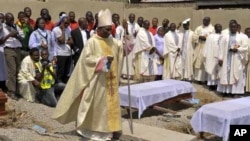The radical Nigerian Islamist sect Boko Haram says it bombed a Christian church Sunday in Jos, killing three people and wounding dozens more.
The suicide bombing was one in a series of recent attacks by the group on Christian targets in northern Nigeria, including a Christmas day bombing of a Catholic church near Abuja that killed at least 37 people.
Following Sunday's attack, Christian youths seeking revenge beat to death two Muslim men in Jos.
Some say Boko Haram's choice of Christian targets is motivated by religion or the perceived political dominance of Christians in central Nigeria. But others say the group is simply capitalizing on existing religious fault-lines to destabilize Africa's most-populous country.
Elizabeth Donnelly, Nigeria analyst for London-based think tank Chatham House, says the militants are exacerbating years of religious violence in the central Nigerian city.
"It may very well be about generating fear and uncertainty and increasing tensions, or any other context of localized violent conflict, [and] suspicion between groups in Nigeria," she says. "It is destabilizing, therefore it weakens the state and that is to Boko Haram's advantage."
Jos is the capital of Plateau State in Nigeria's volatile Middle Belt, a region where the mostly Muslim north meets the mainly Christian south. Inter-communal violence has killed thousands there during the past decade.
Governor of Plateau State Jonah Jang is calling for calm.
"We are trying to make sure churches and mosques are protected from these attacks, the security headquarters are protected, major building(s) are protected, and we want to assure the people of Plateau State that everything possible will be done to unravel what has happened here today," he says. "I urge that we should all calm down and remain law-abiding and remain peaceful."
Police and security have been the primary targets of intensifying violence by Boko Haram, which wages almost daily attacks in the country's north.
The group's name in the Hausa language means "Western education is a sin," a reference to what it sees as a corrupt, Western-educated elite that has confiscated power in Nigeria.
Much about the group remains unknown, but the militants are believed to want stricter application of Sharia, or Islamic law, in northern Nigeria. Attacks attributed to the group have already killed 200 people this year.
Nigerian President Goodluck Jonathan condemned Sunday's church bombing in a written statement, saying "those who seek to divide us by fear and terror will not succeed."
The central government in Abuja, however, has struggled to control the security threat. Complicating matters, analysts say Boko Haram has splintered into various factions with differing aims and methodologies.











